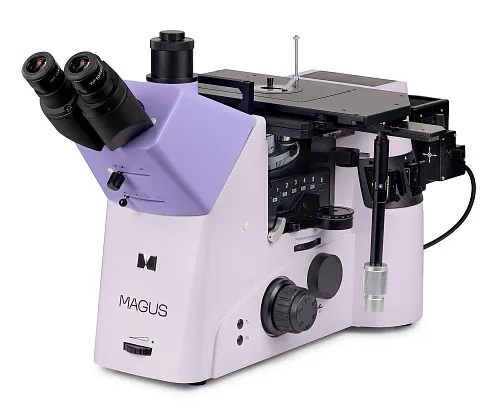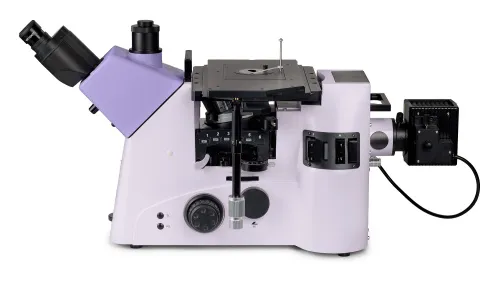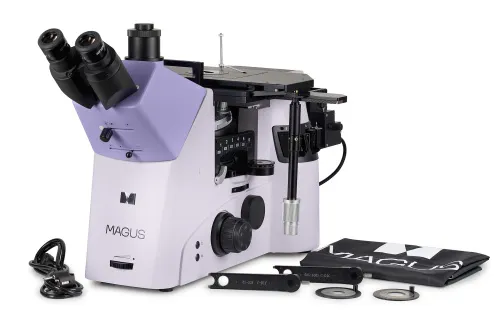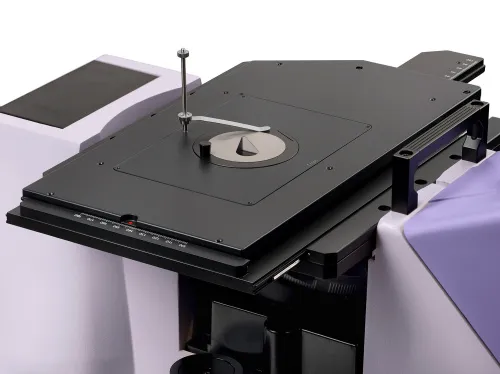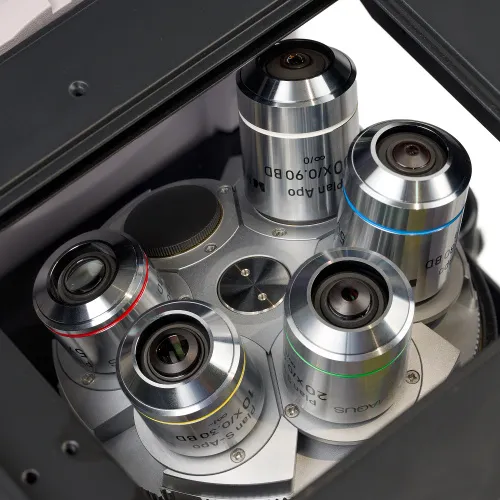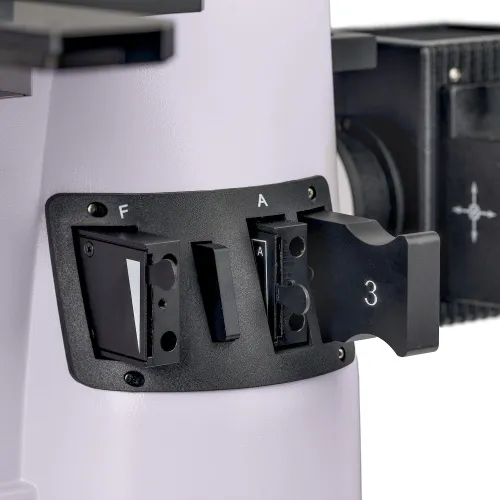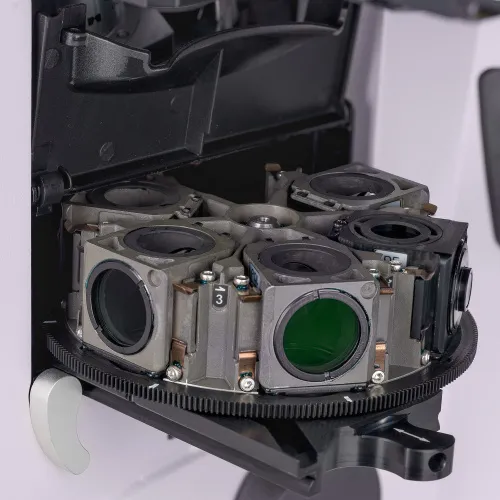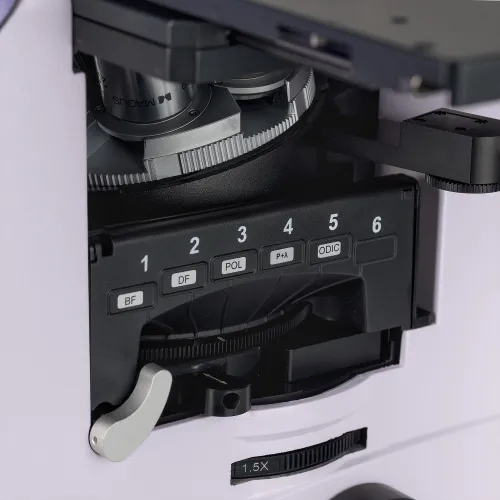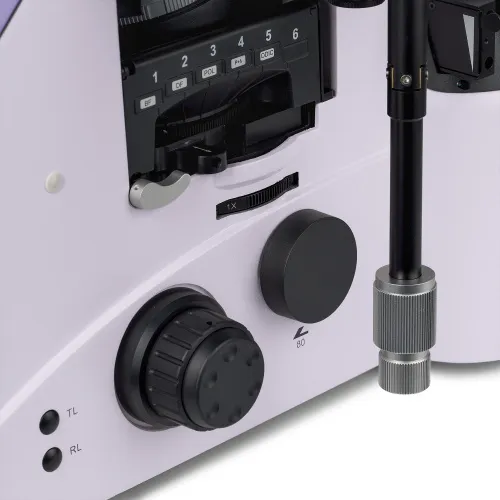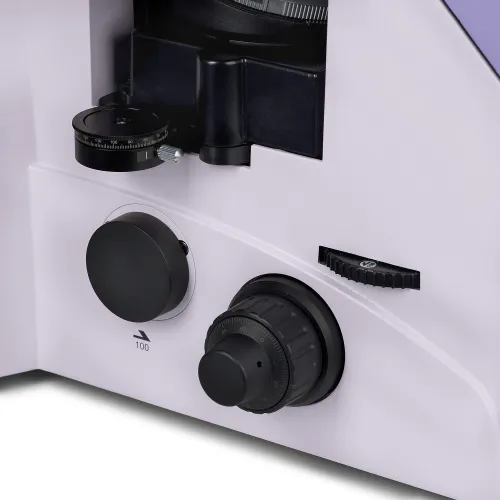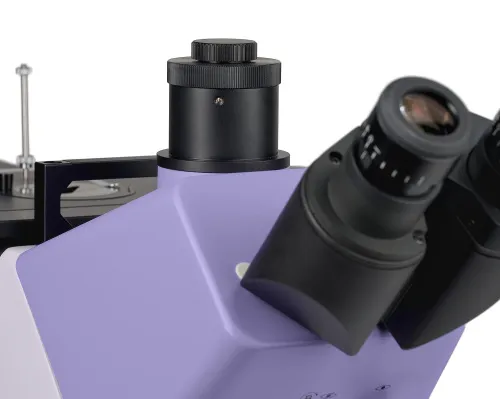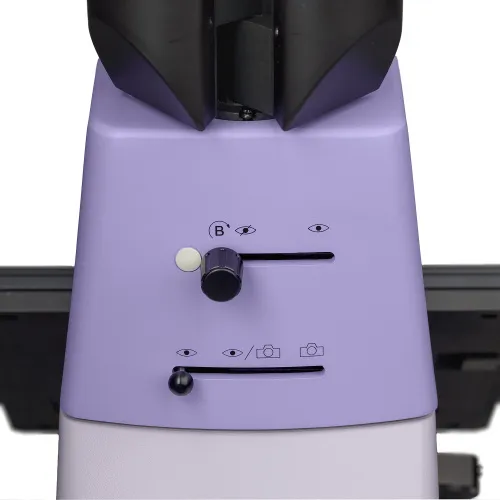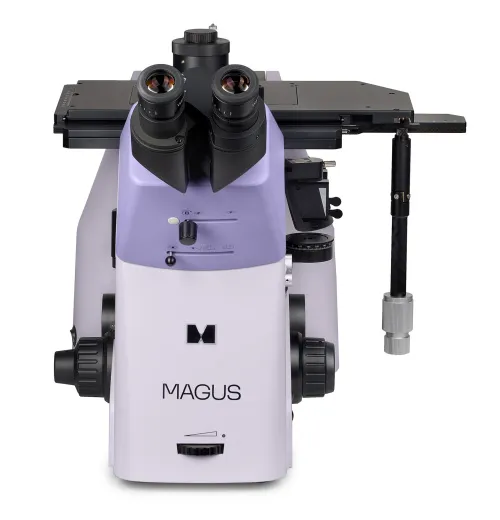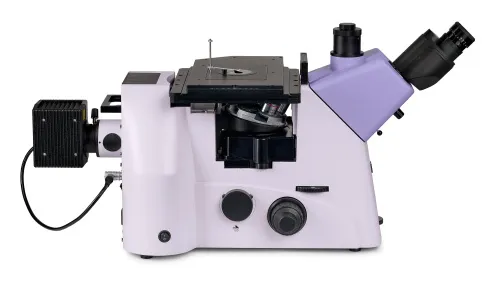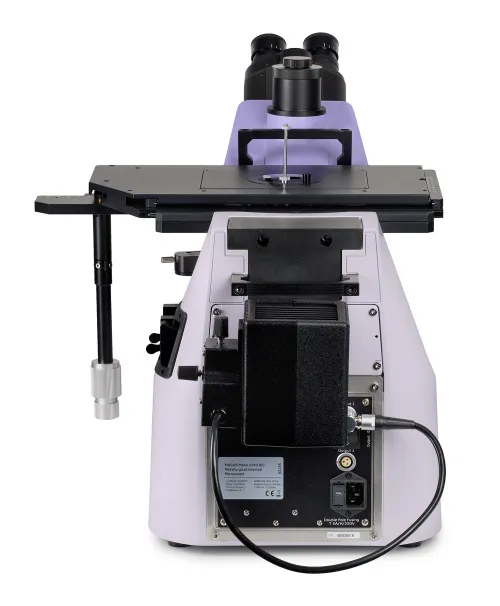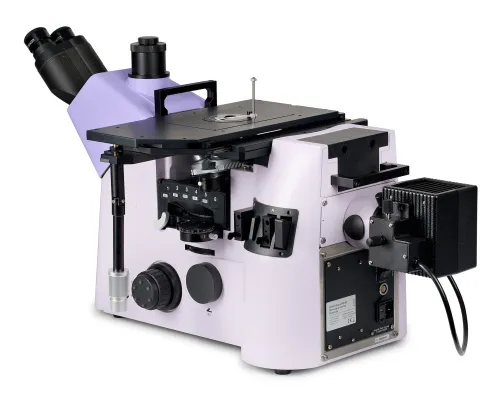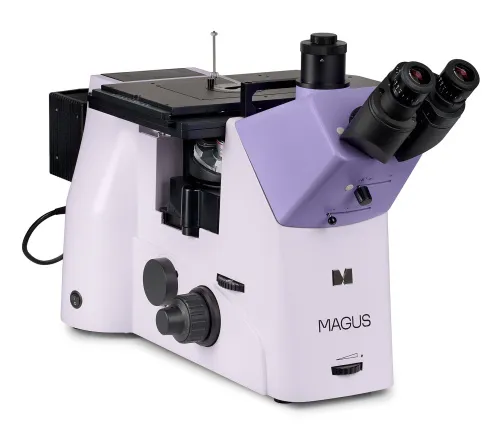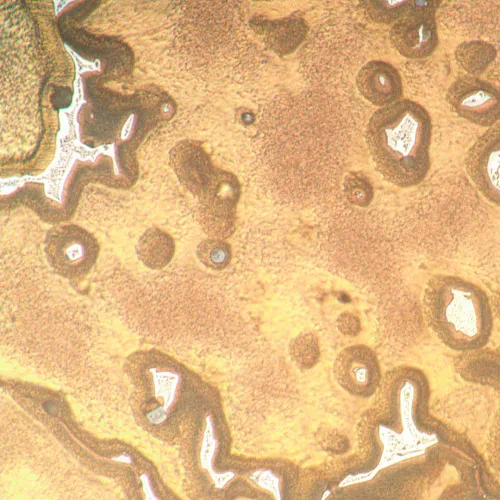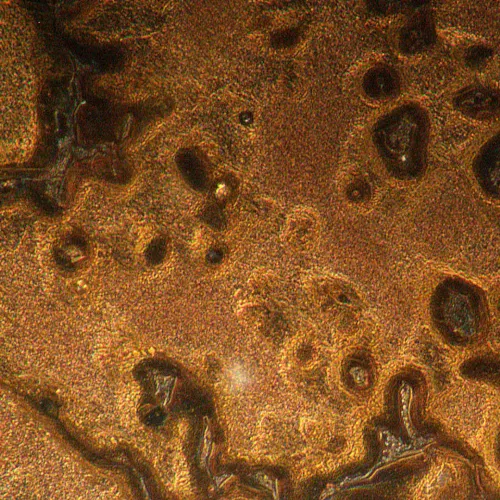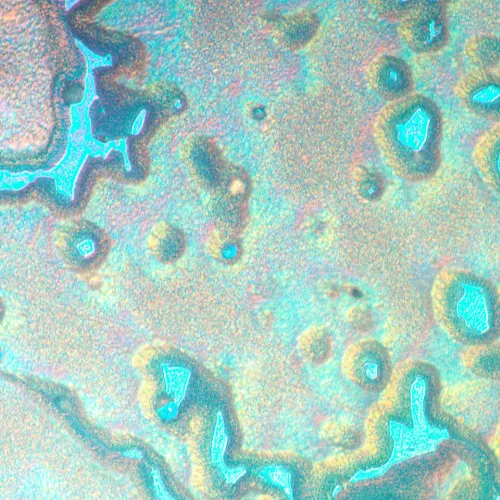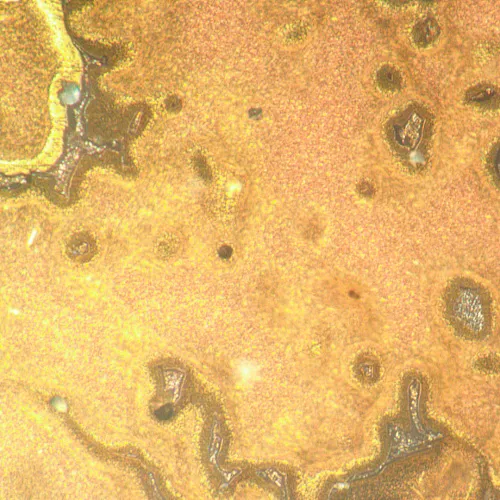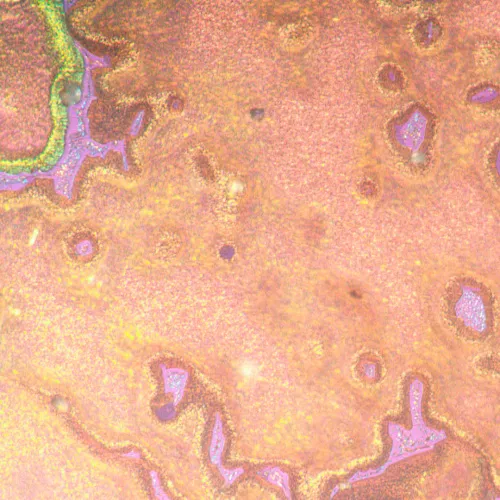MAGUS Metal V790 DIC Metallurgical Inverted Microscope
Magnification: 50–1000x or 50–1500x (with 1.5x lens). Trinocular head with a Bertrand lens, plan semi-apochromatic and plan apochromatic brightfield and darkfield objectives, and a 100W halogen reflected illuminator
| Product ID | 83485 |
| Brand | MAGUS |
| Warranty | 5 years |
| EAN | 5905555019512 |
| Package size (LxWxH) | 76x61x58 cm |
| Shipping Weight | 34.9 kg |
The microscope is designed for studying the microstructure of metals and alloys, semiconductor materials, and other opaque specimens.
The design of the inverted microscope does not limit the size of the examined sample; only its weight is limited up to 30kg. The specimen must be first specially processed, and then it is placed on the stage with the surface down.
This microscope can study opaque objects in reflected light using the brightfield, darkfield, polarization microscopy, and differential interference contrast techniques.
DIC is an advanced polarization contrast technique. The method increases the depth of field and image clarity, provides additional information about the structure of the object under study, and visualizes irregularities on the studied surfaces with color. Flat surfaces are painted equally, but a surface with even minimal differences in height will be uneven in color. The object of study will appear in relief.
The microscope can be used in various fields (metallurgical, engineering, aerospace, nuclear, and energy industries) as well as in research laboratories and technical universities.
Microscope head
Trinocular head with infinity-corrected optics. The 45° tilt angle provides comfortable conditions for the researcher to work while sitting or standing. The user can assume a natural pose and, therefore, fatigue does not accumulate during the workday.
A Bertrand lens is built into the microscope head; a regulator on the front of the head is used to insert it into the optical system. The Bertrand lens is used for conoscopic studies.
The digital camera is installed in the trinocular tube or in one of the side imaging ports on the microscope body. The beam on the trinocular head can be split 100/0, 50/50, or 0/100. The beam splitting on the right photo port is 100/0 and 20/80; it is 100/0 and 0/100 on the left.
The basic package includes 10x/23mm eyepieces with diopter adjustment and long eye relief for working with glasses.
Revolving nosepiece
The 5-objectives revolving nosepiece is mounted on the stand under the stage. The differential interference contrast method is implemented using DIC sliders: One is used with low magnification objectives, and the other with medium and high magnification objectives. The DIC slider is installed in a special slot of the revolving nosepiece.
Turret for installing contrast modules
Under the objective revolver on the microscope stand, there is a turret for installing contrast modules. Six modules can be installed. Rotating the turret changes the observation mode, switching from one contrast method to another occurs quickly and without complex settings.
Switch with an additional magnification lens
A rotary switch is used to insert the main 1x lens or an additional 1.5x magnification lens into the optical path. A magnifying lens increases the magnification of a microscope without purchasing or installing additional accessories. The switch is located on the right side of the microscope body under the revolving nosepiece.
Objectives
Plan semi-apochromatic and plan apochromatic objectives with a long working distance that are designed for the brightfield and darkfield microscopy techniques. Provide better correction of chromatic and spherical aberration compared to plan achromatic objectives.
Focusing mechanism
Coaxial coarse and fine focusing knobs are located at the base of the microscope on both sides. The right fine focusing handle has special recesses for fingers, and the left one has a scale.
The coarse focusing lock knob helps you quickly adjust the microscope after changing the subject of study. The knob is located on the left side of the microscope on the same axis as the focusing mechanism.
The ring on the right side adjusts the tension of the coarse focusing travel. The user adjusts the comfortable tension for work.
Stage
The object is moved by moving the stage along two axes. An insert with a hole of a suitable diameter is installed in the center of the stage. A specimen holder is used to hold the object in place.
The three-layer coating protects the stage from scratches and other surface damage when working with heavy and large samples.
The long tiltable stage control handle ensures user comfort while working: The hand rests on the table without strain. The handle can be installed on the right or left side of the stage.
Light source
The lamphouse has a 100W halogen bulb. It is bright enough to work on objectives with magnifications from 4x to 100x, not only in brightfield and polarized light, but also in darkfield microscopy techniques. The halogen bulb emits light with a color temperature that allows for comfortable work.
Reflected light illumination
The illumination system makes it possible to set up the Köhler illumination. The field and aperture diaphragms are pre-centered at the factory and require no additional centering. If necessary, the diaphragms can be adjusted with centering screws.
The analyzer and polarizer are for the polarization microscopy technique. The polarizer is stationary, and the analyzer rotates 360°.
A set of light filters helps you adjust color reproduction.
Ergonomic design
Physical discomfort causes fatigue and reduces productivity. The ergonomic design of the microscope plays an important role in everyday scientific research.
The MAGUS Metal V790 DIC provides user comfort during work.
The microscope is operated with minimal hand movement since the long stage control handle and fine focusing knob are located in the same working area.
Focusing knobs are located at the bottom of the body. The user does not strain their hands. Thanks to the smooth movement of the mechanism, the user can effortlessly focus on the object.
Key features:
- Suitable for studying opaque dimensional objects up to 30kg
- The Bertrand lens for conoscopy and orthoscopy
- An additional magnification lens increases the magnification of the microscope by 1.5x; it is inserted into the optical system using a switch on the microscope head
- Three independent options for mounting a digital camera and monitor: a trinocular tube and two side tubes on the body; beam splitting on the trinocular head: 100/0, 50/50, 0/100, on the body: 100/0 and 20/80 (right photo port), 100/0 and 0/100 (left photo port)
- Plan semi-apochromatic and plan apochromatic objectives with extended working distance are used for work in the brightfield and darkfield techniques
- Multifunctional turret with 6 slots for installing modules of different contrast methods
- Halogen reflected light illuminator with increased power of 100W, specifically for the darkfield method
- Köhler illumination, centered elements of the illumination system, darkfield, brightfield, polarization, and DIC techniques
- Color filters reduce the intensity of certain wavelengths and adjust the color reproduction in microscope photography
- Large stage with inserts and long control handle for comfortable operation
The kit includes:
- Stage with built-in power supply, focusing mechanism, stage, revolving nosepiece, and turret for installing contrast modules
- Lamphouse
- Trinocular head with a Bertrand lens
- Plan semi-apochromatic objective, infinity-corrected: Plan S-Apo BD 5x/0.15 ∞/- WD 20mm
- Plan semi-apochromatic objective, infinity-corrected: Plan S-Apo BD 10х/0.30 ∞/- WD 11mm
- Plan semi-apochromatic objective, infinity-corrected: Plan S-Apo BD 20х/0.45 ∞/0 WD 3.1mm
- Plan apochromatic objective, infinity-corrected: Plan Apo BD 50х/0.80 ∞/0 WD 1mm
- Plan apochromatic objective, infinity-corrected: Plan Apo BD 100х/0.90 ∞/0 WD 1mm
- Eyepiece 10x/23mm with long eye relief and diopter adjustment (2 pcs.)
- Eyepiece eyecup (2 pcs.)
- DIC slider for objectives (2 pcs.)
- Polarization device
- Filters set
- C-mount camera adapter
- AC power cord
- Dust cover
- User manual and warranty card
Available on request:
- Digital camera
- Calibration slide
| Product ID | 83485 |
| Brand | MAGUS |
| Warranty | 5 years |
| EAN | 5905555019512 |
| Package size (LxWxH) | 76x61x58 cm |
| Shipping Weight | 34.9 kg |
| Type | light/optical, metallurgical |
| Microscope head type | trinocular |
| Head | Siedentopf, with Bertrand lens, beam splitting 100/0, 50/50, 0/100 |
| Head inclination angle | 45 ° |
| Magnification, x | 50 — 1000 |
| Magnification, x (optional) | 50–1500 with built-in 1.5x additional magnification lens |
| Eyepiece tube diameter, mm | 30 |
| Eyepieces | 10x/23mm, long eye relief (2 pcs.) |
| Objectives | plan semi-apochromatic and plan apochromatic objectives, infinity-corrected: 5x/0.15; 10x/0.30; 20x/0.45; 50xs/0.80; 100xs/0.90; parfocal height 45mm |
| Revolving nosepiece | for 6 objectives, with DIC slot |
| Working distance, mm | 20 (5x); 11 (10x); 3.1 (20x); 1 (50xs); 1 (100xs) |
| Interpupillary distance, mm | 48 — 75 |
| Stage, mm | 340x230 |
| Stage moving range, mm | 130/85 |
| Stage features | maximum load 30kg, stage inserts, two-axis three-layer mechanical, with coaxial X/Y handle with low position and tilting capability |
| Eyepiece diopter adjustment, diopters | ±5D on each eyepiece |
| Eyepiece diopter adjustment | ✓ |
| Diaphragm | adjustable aperture diaphragm, adjustable iris field diaphragm |
| Focus | coaxial, coarse (10mm, with a lock knob and tension adjusting knob) and fine (0.002mm, 0.2mm/circle) |
| Illumination | halogen |
| Brightness adjustment | ✓ |
| Power supply | 220±22V, 50Hz, AC network |
| Light source type | 12V/100W |
| Light filters | yes |
| Operating temperature range, °C | 5...+40 |
| Additional | DIC sliders for objectives, polarizer and analyzer, turret for installing contrast modules |
| User level | experienced users, professionals |
| Assembly and installation difficulty level | complicated |
| Application | metallurgical |
| Illumination location | lower (reflected light) |
| Research method | bright field, dark field, polarization, DIC |
| Pouch/case/bag in set | dust cover |
We have gathered answers to the most frequently asked questions to help you sort things out
Find out why studying eyes under a microscope is entertaining; how insects’ and arachnids’ eyes differ and what the best way is to observe such an interesting specimen
Read this review to learn how to observe human hair, what different hair looks like under a microscope and what magnification is required for observations
Learn what a numerical aperture is and how to choose a suitable objective lens for your microscope here
Learn what a spider looks like under microscope, when the best time is to take photos of it, how to study it properly at magnification and more interesting facts about observing insects and arachnids
This review for beginner explorers of the micro world introduces you to the optical, illuminating and mechanical parts of a microscope and their functions
Short article about Paramecium caudatum - a microorganism that is interesting to observe through any microscope

